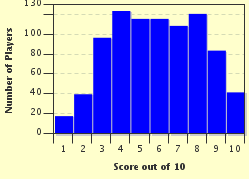Quiz Answer Key and Fun Facts
1. What is an aneurysm?
2. Which cells are destroyed by the body in type 1 diabetes mellitus?
3. Which of the following is a type of generalised seizure experienced by epilepsy sufferers?
4. Ebola is believed to have been passed on to humans originally by which of these?
5. Cardiac tamponade is what?
6. Which disease was first discovered in the 1980's following a large number of gay men becoming ill?
7. The term nephrolithiasis refers to which of the following?
8. Crohn's disease most commonly affects which areas of the gastrointestinal tract?
9. Paracentesis is a procedure used to do what?
10. What is one of the main causes of esophageal varices?
Source: Author
lotrfreak
This quiz was reviewed by FunTrivia editor
crisw before going online.
Any errors found in FunTrivia content are routinely corrected through our feedback system.


